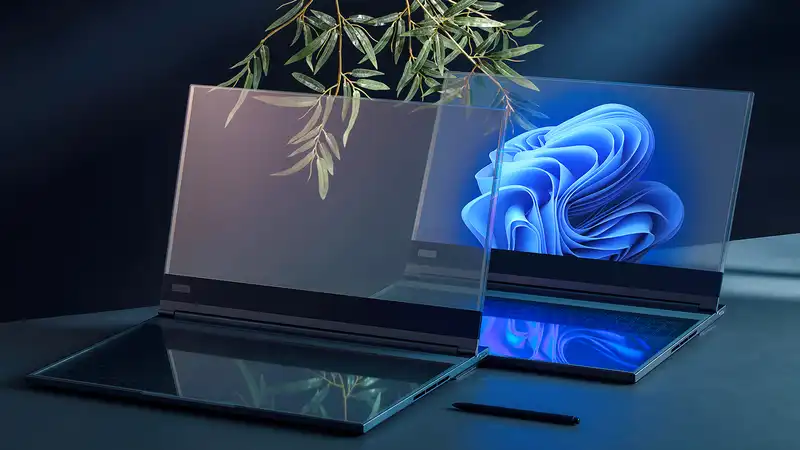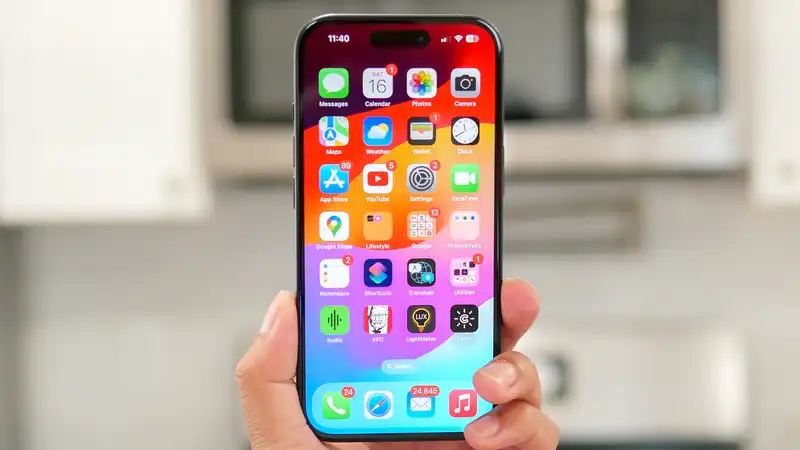Lenovo is showing off a host of new products at the Mobile World Congress in Barcelona this week that will hit store shelves in 2024.
But the most interesting tech product Lenovo brought to the show was never slated to hit a storefront near you: the ThinkBook Transparent Display Laptop, which features a 17.3-inch transparent display.
It's been more than a decade since Samsung brought a prototype of a similar transparent laptop display to CES, but Lenovo's model has the added power of micro-LEDs. I saw a prototype version of this laptop in person in San Francisco a few weeks before MWC 2024, and the display was so bright (Lenovo claims it can achieve 1000 nits at peak) that it almost hurt to look at.
Of course, I was sitting in a dimly lit hotel room during a heavy storm, so take my brief hands-on impression of Lenovo's Transparent Display Laptop with a grain of salt. I don't know if it would be dazzling if used outside in the daytime on a sunny day, but the idea of using a see-through screen laptop at a neighborhood coffee shop is intriguing.
I was even more intrigued when Lenovo showed me the tiny camera embedded in the back of the prototype. One could conceivably use it like an external camera on a tablet to take really ugly pictures while on vacation, but the intended purpose is more intriguing.
The idea is that a laptop designed this way could be used to integrate the world into one's workflow in real time. A digital artist creating a website for a restaurant could place a beautiful brunch plate on the table in front of the laptop, activate the webcam to capture the scene, and then edit it on the transparent display while the original scene remains visible behind.
But this is only a simple example. Lenovo has much more in mind for such a proof-of-concept, including AI-enhanced applications. A Lenovo representative tried to show me a demo of an application that leverages the power of Lenovo's own custom AI chatbots to identify things around the world through a laptop's webcam and answer inquiries about them. For example, it could point the camera at a coffee shop menu in another country and translate it in real time, or record a video and have the AI add visual effects.
Unfortunately, the prototype did not work well while I was using it (due to bad internet at the hotel), so I did not get a chance to see this AI app in action. But hopefully it will be available in Barcelona this week.
Luckily, I had the opportunity to follow up with Tom Butler, Executive Director of Worldwide Product Management at Lenovo. His comments are interesting because they elucidate how Lenovo thinks about this technology. This is perhaps more interesting than a hands-on impression of the prototype itself, as it is a proof of concept that will likely influence the design of future laptops, rather than being sold as an actual product.
With that in mind, here is a brief Q&A with Butler on why Lenovo designed this futuristic prototype, the potential of transparent displays in laptops, and how AI could radically change the way we use PCs over the next decade.
Butler As the broad applications of augmented reality (AR) and the digital world continue to shape various industries, the evolution of laptop devices to meet the growing need for human-machine interaction in production and service environments becomes more pivotal. Transparent screens are emerging as a promising foundation for meeting these demands, providing an interactive interface that can enhance productivity and efficiency.
By integrating AI Generated Content (AIGC) as a key tool, laptops with transparent screens are poised to effectively navigate and adapt to evolving future usage scenarios. As a result, this fusion of cutting-edge technologies is a testament to the continued advancement and adaptation of devices to meet the dynamic demands of the modern work environment.
Butler Micro-LED transparent screens with high transparency, contrast, and brightness open up future possibilities for merging real and virtual environments within the AI PC. This innovative technology offers users the flexibility to adapt to different work environments and meet outdoor work requirements. These screens facilitate seamless integration of the virtual and real worlds, enhanced by AI capabilities, to provide users with an immersive and efficient office experience.
This concept embodies a professional approach that not only explores new user scenarios, but also pushes the boundaries of product forms and innovates technology to enhance the user experience.
Butler The future of personal computing in an AI-driven world is rapidly evolving, and generative AI is at the forefront of this transformation, and the shift to natural language processing will not only change the way users interact with devices, but will also open up new form factor innovation Lenovo is committed to providing reliable technology that is easy to use. As a trusted technology partner, Lenovo recognizes that AI will play a key role in shaping the future of personal computing.
By leveraging the potential of AI, Lenovo is poised to transform its diverse portfolio from PCs to smartphones by making them AI-enabled, AI-optimized devices. These future AI devices will be more powerful, responsive, personalized, secure, and intuitive than ever before, paving the way for enhanced functionality and immersive experiences.
In addition to PCs, AI is also remaking digital devices such as smartphones and tablets to be more user-centric, conversational, always available, and personalized. Lenovo's collaborative efforts with strategic partners share a common vision to lead this transformative shift in personal computing and usher in a new era of innovative, personalized AI solutions designed to enhance the user experience while prioritizing security and privacy controls. It embodies a shared vision to bring about a new era of innovative and personalized AI solutions designed to enhance the user experience while prioritizing security and privacy management.
.









Comments